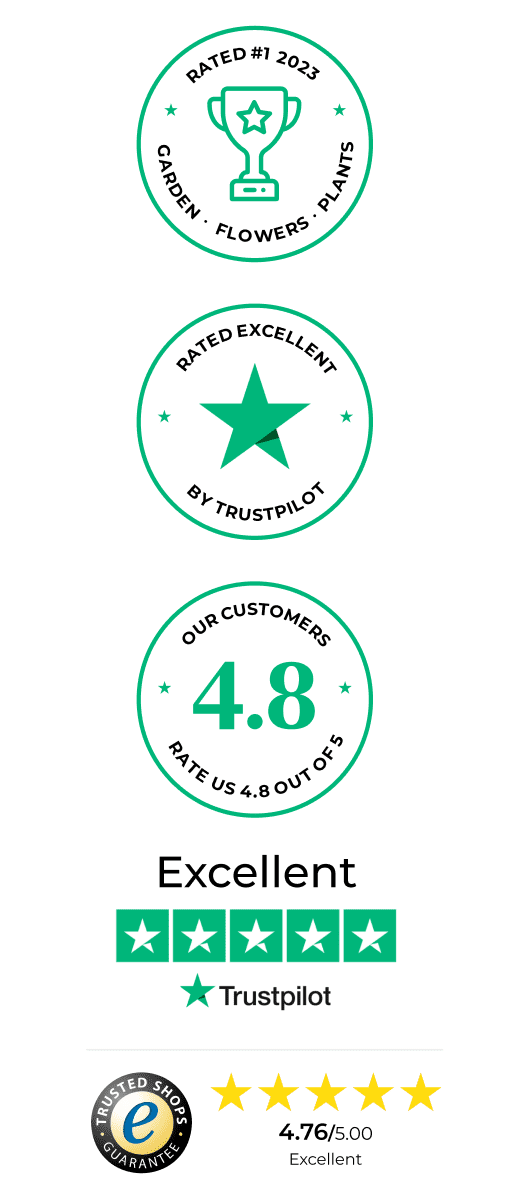Alcea (Malva-Hollyhock)
Alcea (Malva-Hollyhock)
Last Reviews
Discover the Beauty of Alcea (Malva-Hollyhock)
Alcea, commonly known as hollyhocks, are beloved for their tall spires of colorful flowers that add a charming cottage garden feel to any landscape. Originating from Europe and Asia, these biennial or short-lived perennial plants are a favorite among gardeners for their easy care and stunning blooms.
How to Choose the Best Alcea Plants for Sale
When selecting Alcea plants for sale for your garden, it's essential to inspect the overall health of the plants. Look for vibrant foliage, sturdy stems, and well-developed root systems. Avoid plants with yellowing leaves, signs of pests or disease, or those that appear leggy or weak. Additionally, choose plants that are appropriate for your growing zone and consider factors such as bloom color, height, and flowering period to ensure they complement your garden's design. If you like this plant, we suggest you also check out Aquilegia.
Types and Varieties of Alcea
When selecting Alcea plants for your garden, it's essential to consider the various types and varieties available. Some popular options include the following:
- Alcea rosea: This species features single or double flowers in a wide range of colors, including pink, red, yellow, and white.
- Alcea rugosa: Known for its robust growth habit and tolerance to windy conditions, Alcea rugosa produces sturdy stems topped with vibrant flowers.
- Alcea ficifolia: Also known as the Antwerp or Fig-leaved hollyhock, this species is prized for its deeply lobed leaves and tall, elegant flower spikes.
Growing Alcea: Planting and Care
To successfully grow Alcea in your garden, start by selecting a sunny location with well-drained soil. Prepare the planting area by incorporating organic matter to improve soil fertility and drainage. When planting your Dutch bulbs, ensure they are placed at the correct depth and spacing to allow for proper growth.
Water newly planted bulbs thoroughly and provide regular watering throughout the growing season to keep the soil consistently moist. Apply a balanced fertilizer in spring to promote healthy growth and abundant flowering.
Preparing the Soil for Alcea
Before planting Alcea, prepare the soil by incorporating organic matter such as compost or well-rotted manure to improve fertility and drainage. These plants prefer a well-drained, slightly alkaline soil with a pH of 6.0 to 7.0.
Planting Alcea Bulbs
Plant these Netherlands bulbs in a sunny location with well-drained soil. Space the plants approximately 18 to 24 inches apart to allow for proper air circulation and prevent overcrowding. Dig a hole slightly larger than the root ball and backfill with soil, ensuring the crown of the plant is level with the soil surface.
Caring for Your Alcea
To care for Alcea plants, water regularly, especially during dry periods, to keep the soil consistently moist but not waterlogged. Apply a balanced fertilizer in early spring to promote healthy growth and flowering. Deadhead spent flowers to encourage continuous blooming and prevent self-seeding.
Tips for Extending the Blooming Season of Alcea
To prolong the blooming season of Alcea, consider the following tips:
1. Deadheading: Regularly remove spent flowers to encourage the plant to produce new blooms.
2. Mulching: Apply a layer of organic mulch around the base of Alcea plants to retain moisture and suppress weeds, promoting prolonged flowering.
3. Fertilization: Apply a balanced fertilizer every four to six weeks during the growing season to provide essential nutrients for healthy growth and abundant flowering.
Buy Alcea from Holland
When you buy Alcea bulbs from Holland, you're not just purchasing plants – you're investing in quality and reliability. Holland is renowned for its superior bulb quality and meticulous cultivation practices, ensuring that the Alcea bulbs for sale you receive are healthy, vibrant, and ready to flourish in your garden. Experience the convenience of shopping online and the assurance of premium quality when you buy Alcea bulbs from Holland.
Order Your Alcea Today
Experience the beauty of Alcea in your garden by purchasing high-quality bulbs directly from Holland. With their superior cultivation practices and extensive selection of Alcea varieties, you can create a stunning floral display that will enchant you and your visitors. Don't miss out – order Alcea bulbs today and transform your garden into a colorful oasis of blooms!














